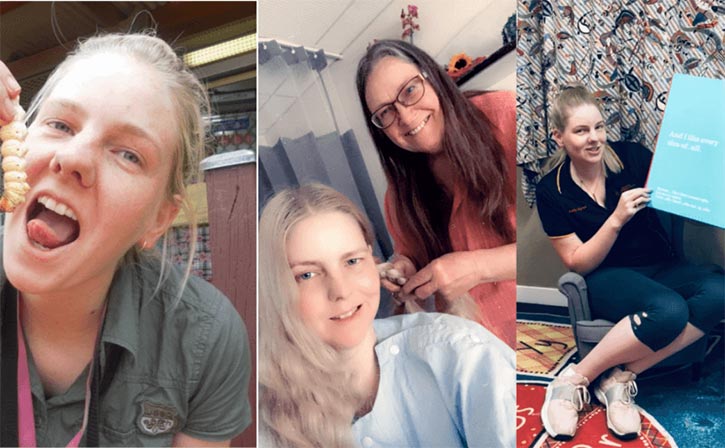Julie and David Heading lost their daughter Nyree to bowel cancer in February 2021, she was just 34.
Nyree was an early childhood educator who early in her career worked in the APY lands in the far northwest of South Australia. She later moved back to Adelaide and was appointed director of the Kaurnu Plains Children’s Centre.
In mid-September 2020, after weeks of back pain Nyree had some scans which showed tumours. Pathology confirmed that Nyree had cancer and she was diagnosed with aggressive malignant stage 4 bowel cancer that had spread to her bones, brain and lymph nodes.
“Reflecting back, her only symptoms were severe backaches, which she believed were caused by the physical nature of playing softball and also from lifting children at the kindy where she worked,” said Nyree’s mother Julie.
“The only symptom that she had ever known related to bowel cancer, was blood in stools, which she never had.”
“She was also very tired and had one bout of bad migraine, both of which doctors put down to work stress,” Julie said.
Bowel Cancer is the second biggest cancer killer in Australia. Australians are fortunate to have the National Bowel Cancer Screening Program that sends testing kits to Australians at the age of 50. These at-home kits contain the materials for a person to collect their own stool sample that they then post to the pathology laboratory for testing.
As population wide screening is currently recommended for people aged 50-74 every 2 years, it is important that younger people do not ignore symptoms and talk to their doctor if they are concerned.
“As older Australians, Julie and I knew about bowel cancer through the 50+ testing,” said Nyree’s father David.
“We thought it was an older person’s disease, and never in our wildest dreams could we have imagined our daughter would fall victim to it at 33 years old.”
According to a study conducted in June 2020, there was a higher-than-expected rate of bowel cancer among those under the age of 501.
The study looked at 557 patients under the age of 50 who were referred for colonoscopy during a 4-year period 2013-2017. Researchers found that 21% had a significant finding after investigations and 1.9% of those were diagnosed with stage 3 or stage 4 bowel cancer.
Those who were diagnosed were young and healthy and had no family history of bowel cancer. Therefore, it is important people do not ignore symptoms even if they don’t seem severe, such as abdominal pain, unexplained fatigue, weight loss and changes in bowel habits.
Other studies from Australia and the United States2 also show that the rates of bowel cancer in people under 50 seem to be rising.
Not everyone experiences symptoms, particularly in the early stages of bowel cancer, according to colorectal surgeon and Bowel Cancer Australia Director Dr Graham Newstead AM.
Common symptoms of bowel cancer can include:
• A recent, persistent change in bowel habit
• A change in shape or appearance of your poo
• Blood in your poo or rectal bleeding
• Frequent gas pain, cramps
• Unexplained anaemia
• A feeling that the bowel has not emptied completely after going to the toilet
• Pain or a lump in the anus or rectum
• Abdominal pain or swelling
“Although these symptoms may be suggestive of bowel cancer, they can also be due to other medical conditions, some foods or medicines,” said Dr Newstead.
“Importantly, if you are experiencing any of the described symptoms for two weeks or more, you shouldn’t delay in talking to your GP, because when diagnosed early almost 99 percent of cases can be successfully treated.”
In creating a detailed and sometimes confronting blog about her cancer journey Nyree was passionate about spreading awareness that you are never too young, and cancer can strike at any age.
Nyree passed away on the 17 February 2021, she is missed terribly by her family and loved ones.
“Since her passing, we have discovered so much more about our daughter’s life. Many people we did not know previously, have contacted us with stories about how Nyree had helped them in their time of need,” Julie said.
In the community around the Children’s Centre where she worked, she was known as “Auntie Nyree”. At her Celebration of Life service, they gratefully offered a Smoking Ceremony, and didgeridoo performance to acknowledge her contributions to the Centre.
“Through Nyree’s blog and through cancer Facebook pages, we now realise how many younger people have been diagnosed with this cruel disease,” David said.
“We want people to know that there are other symptoms, not only blood in stools. Things like backaches, tiredness, headaches. Even though these can be related to other problems, we want people to insist their doctors check thoroughly, to rule out the possibility of any cancers.”
Anyone experiencing symptoms can speak to their healthcare professional about pathology tests and next steps.
To find out more about bowel cancer or to speak with a Bowel Care Nurse, visit www.bowelcanceraustralia.org or call the free Helpline 1800 555 494.
References:
1. https://onlinelibrary.wiley.com/doi/abs/10.1111/ans.16060
2. https://www1.racgp.org.au/newsgp/clinical/new-evidence-suggests-it-s-time-to-lower-australia
*Image credit: with thanks to Nyree’s family and Bowel Cancer Australia

